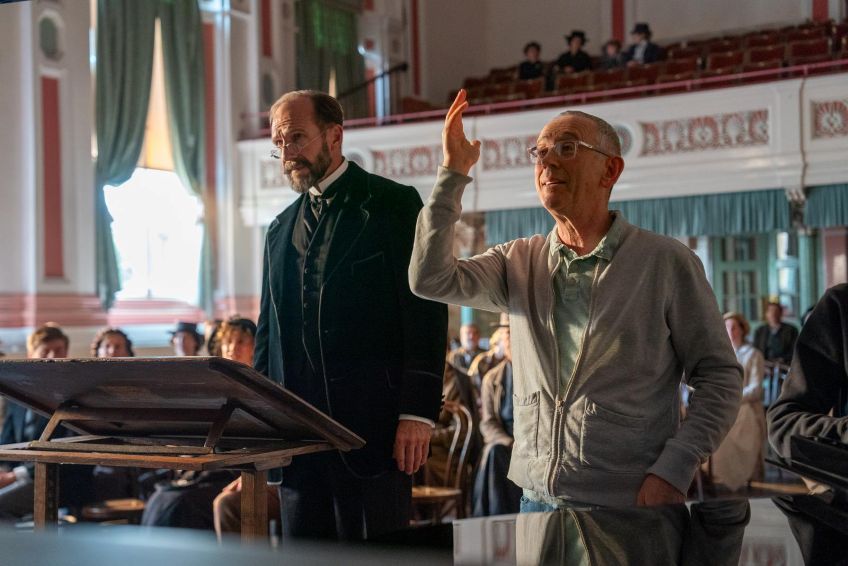Joyce Glasser reviews The Choral (November 7, 2025) Cert 12A, 113 mins.
The Choral’s director and co-producer, Nicholas Hytner and its script writer, Alan Bennett have a lot in common. They are both over 65, (Bennett is 91) and they are not Londoners: Hytner is from Manchester, Bennett from Leeds. They have roots in theatre that have spread to successful cinema collaborations including The Lady in the Van, The Madness of King George III and The History Boys. And they are both gay.
So, it should come as no surprise that their new film bears the stamps of this close personal and professional collaboration, right down to the historical subject matter (WWI), the staginess, the gentleness, the wry humour, the sadness, and two characters who are gay outsiders gifted with art and intellect.
Both musicians and atheists (artists have, long before Thomas Mann’s Tonio Kröger, been the observant outsiders), musicologist Dr Henry Guthrie (an unchallenged Ralph Fiennes) and his pianist, Robert Horner (Robert Emms) are suspect in an anonymous northern town at the start of World War I. Robert is a conscientious objector who is unresponsive to female advances, and German speaking Guthrie has been living in Germany for his research, and, we learn, for a special friend who has enlisted.
But when pillar-of-the-community and head of the Choral Society, Alderman Bernard Duxbury (Roger Allam) loses his choral master to the army recruiter, he takes a risk on Guthrie and makes the reluctant academic an offer he eventually accepts. The first problem is the choice of music. The group is starting rehearsals on Bach’s St Matthew’s Passion, but when a brick comes through the hall window, German composers are out.

Guthrie helpfully proposes Elgar’s The Dream of Gerontius, but since the work is only 15 years old, they need Elgar’s permission to perform it. The well-connected Guthrie obtains it directly from Elgar, neglecting to mention, when the time comes, that they had taken dramatic licence with the characters.
The changes come early on. No amount of training can turn the proud Duxbury into a viable Gerontius. Singing has become his life but is really a crutch or distraction since the death of his only son. He can’t face his wife, and his home only reminds him of the loss he bears stoically.
Then, there’s the shortage of male singers. Although a recruitment drive through the local shopkeepers and hospitals bears fruit, there is still no Gerontius.
Against this background, relationships develop, and boys leaving for war want to lose their virginity in case they die before finding a girlfriend. Bella, (Emily Fairn) flirty and feisty if not faithful, gets tired of waiting for her boyfriend Clyde (Jacob Dudman) – missing in action – and starts a relationship with another member of the society.
When Clyde returns, still handsome, but with one arm missing, Bella quietly rejects him, but not before helping him masturbate, on their old spot on the Yorkshire moors, since he is not used to doing so with his remaining limb.

To Guthrie’s delight, Clyde has a beautiful tenor voice. And the Salvation Army nurse Mary (Amara Okereke) has the voice of an angel.
The Dream of Gerontius is an oratorio based on a 19th century poem by the English Cardinal John Henry Newman, a convert to Catholicism who believes in purgatory. None of the town’s Anglicans or the two atheists are too keen on the Catholicism. Completed in 1900, Elgar’s piece depicts the journey of a devout, old man’s soul from his final moments on Earth to his judgment and his waiting time in Purgatory.
Members of the society come up with a brilliant way of making this piece not only relatable, but of casting a very young man for the old Gerontius, dying of natural causes. When Elgar (Simon Russell Beale) learns of the changes, he withdraws permission at the last minute. The resilient group get around this by making the concert free. Clearly Elgar never read Newman’s famous line, “to live is to change, and to be perfect is to have changed often.”
The pulling power of what is a commendable Hytner/Bennett collaboration comes with the transformation of the Newman/Elgar oratorio from a glorious piece of music with an unrelatable and over the top libretto, to a gut-wrenching anti-war anthem to lost youth.
Clyde, in his uniform plays a young Gerontius, dying on the battlefield and facing his maker. Mary, in her uniform with a red cross, high on the balcony opposite the stage reaches out to him, as if coming from heaven to guide him. We are treated to a sizeable taster of this magnificent work that is completely transformed by the staging and casting. Tears will be shed.
The two outsiders will depart after the performance, and more boys will go to war. But while in this microcosm, they hold a mirror up to a Yorkshire town, so that everyone is forced to take a good look at themselves, step up to the plate and emerge the better for it.




